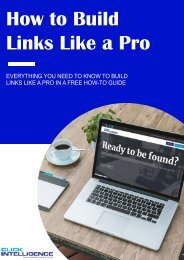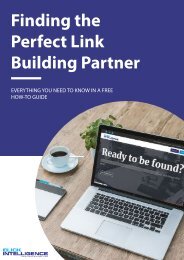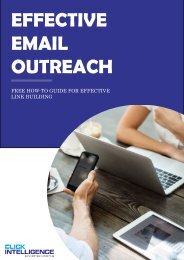A Guide to: SEO The Basics
SEO (Search Engine Optimisation) is the process of getting traffic from search results on search engines. Google and other search engines rank and display pages it considers relevant and authoritative. SEO combines both technical and creative elements to improve your rankings in search results and drive traffic to your site. Having said this, SEO isn’t solely about driving search engine traffic; it’s also about optimising your site for the user. This guide offers a breakdown of the basic elements of SEO and why each are important for your site.
SEO (Search Engine Optimisation) is the process of getting traffic from search results on search engines. Google and other search engines rank and display pages it considers relevant and authoritative. SEO combines both technical and creative elements to improve your rankings in search results and drive traffic to your site.
Having said this, SEO isn’t solely about driving search engine traffic; it’s also about optimising your site for the user. This guide offers a breakdown of the basic elements of SEO and why each are important for your site.
Create successful ePaper yourself
Turn your PDF publications into a flip-book with our unique Google optimized e-Paper software.
<strong>SEO</strong>:<br />
<strong>The</strong> <strong>Basics</strong><br />
EVERYTHING YOU NEED TO KNOW ABOUT THE<br />
BASICS OF <strong>SEO</strong> IN A FREE HOW-TO GUIDE
What is <strong>SEO</strong> and why does my website need it?<br />
<strong>SEO</strong>:<br />
<strong>The</strong> <strong>Basics</strong><br />
<strong>SEO</strong> (Search Engine Optimisation)<br />
is the process of getting traffic from<br />
search results on search engines.<br />
Google and other search engines<br />
rank and display pages it considers<br />
relevant and authoritative. <strong>SEO</strong><br />
combines both technical and<br />
creative elements <strong>to</strong> improve your<br />
rankings in search results and drive<br />
traffic <strong>to</strong> your site.<br />
Having said this, <strong>SEO</strong> isn’t solely<br />
about driving search engine traffic;<br />
it’s also about optimising your site<br />
for the user. This guide offers a<br />
breakdown of the basic elements of<br />
<strong>SEO</strong> and why each are important for<br />
your site.
Starting point:<br />
Keyword Research<br />
<strong>The</strong> first thing <strong>to</strong> consider when thinking about <strong>SEO</strong> is the words or<br />
phrases people will likely search for that relate <strong>to</strong> your business, product<br />
or services. Ranking well for relevant keywords can make or break your<br />
website.<br />
It is important <strong>to</strong> attract the right kind of visi<strong>to</strong>rs <strong>to</strong> your site, as visi<strong>to</strong>rs<br />
interested in your site are likely <strong>to</strong> result in financial rewards or other<br />
organisational goals. However, until you know what words and phrases<br />
are relevant <strong>to</strong> your website, you cannot properly optimise your page<br />
and the content within it <strong>to</strong> draw in traffic.
Keyword<br />
Research<br />
When thinking about keywords, you<br />
need <strong>to</strong> consider how well it will convert<br />
<strong>to</strong> actual rewards. Consider whether<br />
searchers will find what they are looking<br />
for when they come <strong>to</strong> your site using this<br />
keyword – are they likely <strong>to</strong> spend time<br />
on your site once they arrive?<br />
Next, look in<strong>to</strong> what other websites<br />
already rank for the keywords you have<br />
in mind. If many search ads appear in the<br />
search results of your chosen keyword,<br />
then it typically means a high- value<br />
keyword. <strong>The</strong>re is a range of <strong>to</strong>ols <strong>to</strong> help<br />
with your keyword research; see our<br />
favourite resources listed at the end of<br />
this chapter.
Long Tail Keywords<br />
<strong>The</strong> best keywords are the ones that<br />
have the most searches… Not quite. <strong>The</strong><br />
most popular keywords tend <strong>to</strong> be broad,<br />
generic terms such as ‘dresses’. However, in<br />
reality, these terms make up less than 30%<br />
of searches performed on the web. <strong>The</strong><br />
remaining 70% is made up from what is<br />
termed ‘Long Tail’ searches.<br />
<strong>The</strong>se are unique searches made up of<br />
specific words and phrases, such as ‘Blue<br />
Maxi Dress size 10’. Long Tail keywords<br />
convert much better than generic<br />
keywords. For example, the person<br />
searching for ‘blue maxi dress size 10’<br />
has a specific item in mind and is much<br />
closer <strong>to</strong> purchase than someone simply<br />
browsing for ‘dresses’.
Long Tail Keywords -<br />
Continued<br />
It’s not just important <strong>to</strong> understand<br />
how popular a phrase is with<br />
searchers, but also how hard it is <strong>to</strong><br />
rank highly with that certain search. If<br />
big brands in your niche take the <strong>to</strong>p<br />
ten results in that search and you’re a<br />
relatively small company, it could take<br />
more effort than it would be worth <strong>to</strong><br />
rank well for that search. This is where<br />
long tail keywords are your friend.<br />
<strong>The</strong> more specific the words and<br />
phrase are, you’re less likely <strong>to</strong> be<br />
targeted by a bigger competi<strong>to</strong>r,<br />
and so your page has a better<br />
chance of being ranked highly for<br />
it. Finding appropriate keywords<br />
for your site; which you also have<br />
a good chance of ranking well<br />
with, should be the foundation of<br />
your <strong>SEO</strong> strategy.
Now that you know what keywords you<br />
want <strong>to</strong> incorporate, you need <strong>to</strong> optimise<br />
your web page, so search engines deem it<br />
worthy of a good rank.<br />
However, this is not simply a case of sticking<br />
keywords all over a web page’s HTML<br />
so that a search engine picks up on it!<br />
Search engines use complex algorithms<br />
which analyse user experience (their inclination<br />
<strong>to</strong> stay on the site, link <strong>to</strong> it and<br />
share its content).<br />
Most <strong>SEO</strong>’s now opt for a rounded<br />
approach and are willing <strong>to</strong> sacrifice<br />
perfect keyword placement in favour<br />
of better user experience. That said,<br />
wherever possible, keywords should be<br />
optimised throughout a page.<br />
ON PAGE<br />
<strong>SEO</strong><br />
Here are the six crucial ways you should<br />
be optimising your keywords:
Optimise your keywords<br />
1.<br />
’Title tags’ (page title):<br />
Usually, it should be an accurate and concise description of a page’s content.<br />
Title tags are used on search engine results pages (SERPs) <strong>to</strong> display<br />
previews of a page. <strong>The</strong>y are key <strong>to</strong> how a search engine determines the<br />
relevance of a page and also dramatically increases the searcher’s inclination<br />
<strong>to</strong> click. Optimising Keyword for search engines and user visibility<br />
should, therefore, be the prime goal.
Optimise your<br />
keywords - Continued<br />
2. Headings:<br />
Generally, you should only have one H1<br />
heading per page and then a few subsequent<br />
H2 subheadings. <strong>The</strong>se headings<br />
should contain keywords while being relevant<br />
<strong>to</strong> the content on the page.<br />
3. Body Text:<br />
Using your keywords within the content<br />
of your page is vital, though it should not<br />
just be placed randomly or be overly used.<br />
Search engines assess the relevance and<br />
quality of keyword placement within the<br />
body of the text.
Optimise your keywords - Continued<br />
4. URL:<br />
<strong>The</strong> URL should describe a page <strong>to</strong> visi<strong>to</strong>rs and search engines. Keywords<br />
that appear in a URL help search engines determine relevancy directly.<br />
5. Meta Description:<br />
Meta descriptions are not used<br />
directly in search engine rankings,<br />
but they are still important. If the<br />
Meta description incorporates<br />
a keyword query, it will usually<br />
show up in the search results and<br />
can play a big part in whether<br />
users decide <strong>to</strong> click through.
6. Images and Image<br />
alt attributes:<br />
For search engines <strong>to</strong> be able<br />
<strong>to</strong> properly index an image, ‘alt<br />
tags’ need <strong>to</strong> be added <strong>to</strong> the<br />
image. It can help the image<br />
show up in an image result<br />
of a search and, indirectly,<br />
it is useful <strong>to</strong> have a visual<br />
representation associated with<br />
a brand name or site.<br />
<strong>The</strong>re are some fantastic resources <strong>to</strong> help<br />
you with keyword placement and on page<br />
<strong>SEO</strong> in general.<br />
While optimised Keywords within the<br />
features of a page produce reasonable<br />
correlations in search engine rankings,<br />
other on page elements often have an<br />
even greater impact. <strong>The</strong> most significant<br />
of these elements is the actual content on<br />
the page. Content is the reason people click<br />
and stay on a website; keyword placement<br />
should never compromise what you are<br />
writing about. <strong>The</strong> content on a page<br />
should be unique; it should offer specific<br />
information on that <strong>to</strong>pic and provide the<br />
user with valuable insight.
Site Structure<br />
Your site structure is also crucial. <strong>The</strong> way the<br />
pages on your link <strong>to</strong>gether has a big impact on<br />
rankings. A good site structure provides your site<br />
with site links, which increase the navigability<br />
of your site and point users <strong>to</strong> the most relevant<br />
information. Sitelinks improve the user’s trust in<br />
your site and will ultimately boost your rankings.<br />
Your site structure should be logical, there<br />
shouldn’t be <strong>to</strong>o many main categories, and you<br />
should balance the amount of subcategories<br />
within each category.
Site structure - Continued<br />
If you don’t get this basic element right, it<br />
will be very hard <strong>to</strong> develop a successful<br />
<strong>SEO</strong> strategy. A strong site structure<br />
should allow both users and search<br />
engines <strong>to</strong> navigate your website. An <strong>SEO</strong><br />
friendly site structure gives your site a<br />
solid foundation from which you build up<br />
your <strong>SEO</strong> strategy throughout the rest of<br />
your site and beyond.
Off Page <strong>SEO</strong><br />
Unfortunately, having a beautiful site with<br />
great content, and keywords optimised<br />
<strong>to</strong> the max, sometimes isn’t enough <strong>to</strong><br />
rank well in search engines. Activities that<br />
exist outside of the boundaries of the web<br />
page can have a huge impact on search<br />
engine rankings; we call this ‘Off Page<br />
<strong>SEO</strong>.’<br />
Link building is perhaps the most<br />
important aspect of Off Page <strong>SEO</strong>. Search<br />
engines attribute a lot of value <strong>to</strong> who<br />
and how many people are linking <strong>to</strong> a site.<br />
A website that has lots of links from other<br />
websites is considered by search engines<br />
<strong>to</strong> be an authority within that particular<br />
<strong>to</strong>pic.<br />
Similarly, trustworthy sites tend <strong>to</strong> link<br />
<strong>to</strong> other trustworthy sites which search<br />
engines also deem <strong>to</strong> be an indication of<br />
an important site. <strong>The</strong>re are three basic<br />
types of links:<br />
Outreach, natural and self<br />
created
Off Page <strong>SEO</strong><br />
Types of links<br />
Outreach<br />
Outreach link building makes up a crucial part of link building. It<br />
requires manually contacting bloggers and creating a proposition<br />
whereby you explain why a link <strong>to</strong> your site would be in their interest,<br />
usually as a valuable source of information within that niche.<br />
Natural<br />
Natural or Edi<strong>to</strong>rial Links are links given naturally by sites that want <strong>to</strong><br />
link <strong>to</strong> your content. <strong>The</strong>se links require no specific action from the <strong>SEO</strong><br />
other than that great content is likely <strong>to</strong> generate links like of this nature.
Types of links - Continued<br />
Self-Created,<br />
Self-Created, non-edi<strong>to</strong>rial are links that are created through guest book<br />
signings, forum signatures, blog comments, or user profiles. <strong>The</strong>se links<br />
are relatively low value in terms of search engine rankings, but when<br />
taken as an aggregate they can still have an impact. In general, search<br />
engines continue <strong>to</strong> devalue these types of links which it increasingly<br />
views as spammy. <strong>The</strong>y have been known <strong>to</strong> penalise sites that pursue<br />
this type of link aggressively.
Link Building<br />
Link building has become one of the most critical tasks required in<br />
<strong>SEO</strong>. We will go in<strong>to</strong> much more detail about effective link building<br />
in later chapters. Nevertheless, here are some of the basics of link<br />
building that are important <strong>to</strong> understanding:<br />
- Avoid links from spammy or irrelevant sites.<br />
- Links within content are more effective than links in a sidebar or footer.<br />
- Anchor text plays the most important role in link building.<br />
- However, if all your links are <strong>to</strong>o rich in anchor text, it can have a<br />
negative effect as Google will become suspicious.<br />
- Reciprocal links (I link <strong>to</strong> you, and you link <strong>to</strong> me) are not <strong>to</strong>o effective<br />
and will be picked up by Google.
Link Building - Continued<br />
While link building is crucial; there is more <strong>to</strong> Off Page <strong>SEO</strong>. Although<br />
there is no evidence that social shares on the likes of Twitter and<br />
Facebook have an affect on rankings, Google has begun <strong>to</strong> incorporate<br />
a huge number of social signals in<strong>to</strong> its search results. Someone with a<br />
large social circle, who shares a lot of material, is more likely <strong>to</strong> see their<br />
material promoted in search results. For publishers, it’s beneficial <strong>to</strong><br />
have your content shared influential users with large social followings.
Conclusion<br />
Link building is perhaps the most important aspect of Off Page <strong>SEO</strong>.<br />
<strong>The</strong>re are three basic types of links for link building:<br />
Outreach link building - It requires manually contacting bloggers and<br />
creating a proposition whereby you explain why a link <strong>to</strong> your site<br />
would be in their interest, usually as a valuable source of information<br />
within that niche.<br />
Natural or Edi<strong>to</strong>rial Links - links given naturally by sites that want <strong>to</strong><br />
link <strong>to</strong> your content. <strong>The</strong>se links require no specific action from the<br />
<strong>SEO</strong> other than that great content is likely <strong>to</strong> generate links like of this<br />
nature.<br />
Self-Created, Non-Edi<strong>to</strong>rial are links that are created through guest<br />
book signings, forum signatures, blog comments, or user profiles. <strong>The</strong>se<br />
links are relatively low value in terms of search engine rankings. In<br />
general, search engines continue <strong>to</strong> devalue these types of links which<br />
it increasingly views as spammy.
Link building has become one of the most critical tasks required in <strong>SEO</strong>.<br />
Avoid links from spammy or irrelevant sites.<br />
Links within content are more effective than links in a sidebar or footer.<br />
Anchor text plays the most important role in link building.<br />
However, if all your links are <strong>to</strong>o rich in anchor text, it can have a negative<br />
effect as Google will become suspicious.<br />
Reciprocal links (I link <strong>to</strong> you, and you link <strong>to</strong> me) are not <strong>to</strong>o effective and<br />
will be picked up by Google.<br />
While link building is crucial; there is more <strong>to</strong> Off Page <strong>SEO</strong>.<br />
social shares on the likes of Twitter and Facebook have an affect on rankings,<br />
and Google has begun <strong>to</strong> incorporate a huge number of social signals<br />
in<strong>to</strong> its search results. For publishers, it’s beneficial <strong>to</strong> have your content<br />
shared influential users with large social followings.
Fancy something else for<br />
FREE?<br />
Give us a call <strong>to</strong>day if you’d like a completely FREE <strong>SEO</strong> AUDIT with<br />
one of our <strong>to</strong>p consultants.<br />
01242 807842<br />
www.clickintelligence.co.uk







